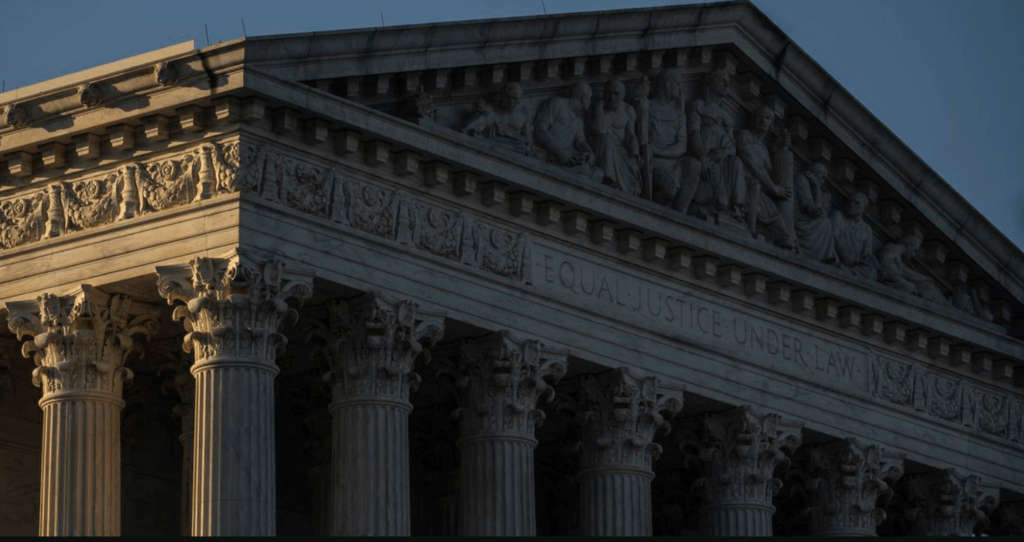
In a landmark decision, the Supreme Court overturned Roe V Wade, which established a constitutional right to abortion in 1973.
On Friday the much-awaited decision was reached in Roe V Wade. The Supreme Court overturned Roe V Wade, effectively ending recognition of a constitutional right to abortion and giving individual states the power to allow, limit, or ban the practice altogether.
The ruling came in the court’s opinion in Dobbs v. Jackson Women’s Health Organization, which centered on a Mississippi law that banned abortion after 15 weeks of pregnancy. The Republican-led state of Mississippi asked the Supreme Court to strike down a lower court ruling that stopped the 15-week abortion ban from taking place.

“We hold that Roe and Casey must be overruled,” Justice Samuel Alito wrote for the majority in Dobbs v. Jackson Women’s Health Organization, a case concerning a Mississippi law that, with few exceptions, bans abortions after 15 weeks.
DOBBS, STATE HEALTH OFFICER OF THE
MISSISSIPPI DEPARTMENT OF HEALTH, ET AL. v.
JACKSON WOMEN’S HEALTH ORGANIZATION ET AL.
CERTIORARI TO THE UNITED STATES COURT OF APPEALS FOR
THE FIFTH CIRCUIT
No. 19–1392. Argued December 1, 2021—Decided June 24, 2022
Mississippi’s Gestational Age Act provides that “[e]xcept in a medical
emergency or in the case of a severe fetal abnormality, a person shall
not intentionally or knowingly perform . . . or induce an abortion of an
unborn human being if the probable gestational age of the unborn human being has been determined to be greater than fifteen (15) weeks.”
Miss. Code Ann. §41–41–191. Respondents—Jackson Women’s Health
Organization, an abortion clinic, and one of its doctors—challenged the
Act in Federal District Court, alleging that it violated this Court’s precedents establishing a constitutional right to abortion, in particular Roe
v. Wade, 410 U. S. 113, and Planned Parenthood of Southeastern Pa.
v. Casey, 505 U. S. 833. The District Court granted summary judgment in favor of respondents and permanently enjoined enforcement
of the Act, reasoning that Mississippi’s 15-week restriction on abortion
violates this Court’s cases forbidding States to ban abortion pre-viability. The Fifth Circuit affirmed. Before this Court, petitioners defend
the Act on the grounds that Roe and Casey were wrongly decided and
that the Act is constitutional because it satisfies rational-basis review
The court upheld the Mississippi law, which was challenged as unconstitutional under the Supreme Court precedents established in Roe and Planned Parenthood v. Casey (1992).


“We end this opinion where we began. Abortion presents a profound moral question. The Constitution does not prohibit the citizens of each State from regulating or prohibiting abortion. Roe and Casey arrogated that authority. We now overrule those decisions and return that authority to the people and their elected representatives,” Justice Samuel Alito wrote in the court’s opinion.
“The Court did not explain the basis for this line, and even abortion supporters have found it hard to defend Roe’s reasoning,” Alito wrote.
Now that the decision has been made, the Constitution will no longer guarantee the right to an abortion. Not that it ever should have. However, this does not mean that access to it has been removed. In fact, most blue states, such as California, Maryland, Illinois, and Massachusetts, have solidified the right to abortion in state law, meaning accessibility there will not change.
The move to overturn the 1973 decision simply gives the right to decide abortion laws back to states.
As of Friday 13 states already have “trigger laws” which would automatically restrict abortions almost immediately within those states with few exceptions.
Arkansas, Idaho, Kentucky, Louisiana, Mississippi, Missouri, North Dakota, Oklahoma, South Dakota, Tennessee, Texas, Utah, and Wyoming all have such laws on the books.
Missouri led the way by becoming the first state to “effectively end abortion in Missouri.”
“With this attorney general opinion, my Office has effectively ended abortion in Missouri, becoming the first state in the country to do so following the Court’s ruling,” AG Eric Schmitt said.
“My Office has been fighting to uphold the sanctity of life since I became attorney general, culminating in today’s momentous court ruling and attorney general opinion. I will continue the fight to protect all life, born and unborn,” he said.
These abortion laws outlaw any pregnancy termination that isn’t required by “medical emergency” when the pregnant woman’s life is in danger.
Anyone who provides or attempts to provide an abortion service will now be charged with a felony, which is punishable by prison time or large fines up to $100,000, depending on the state.

